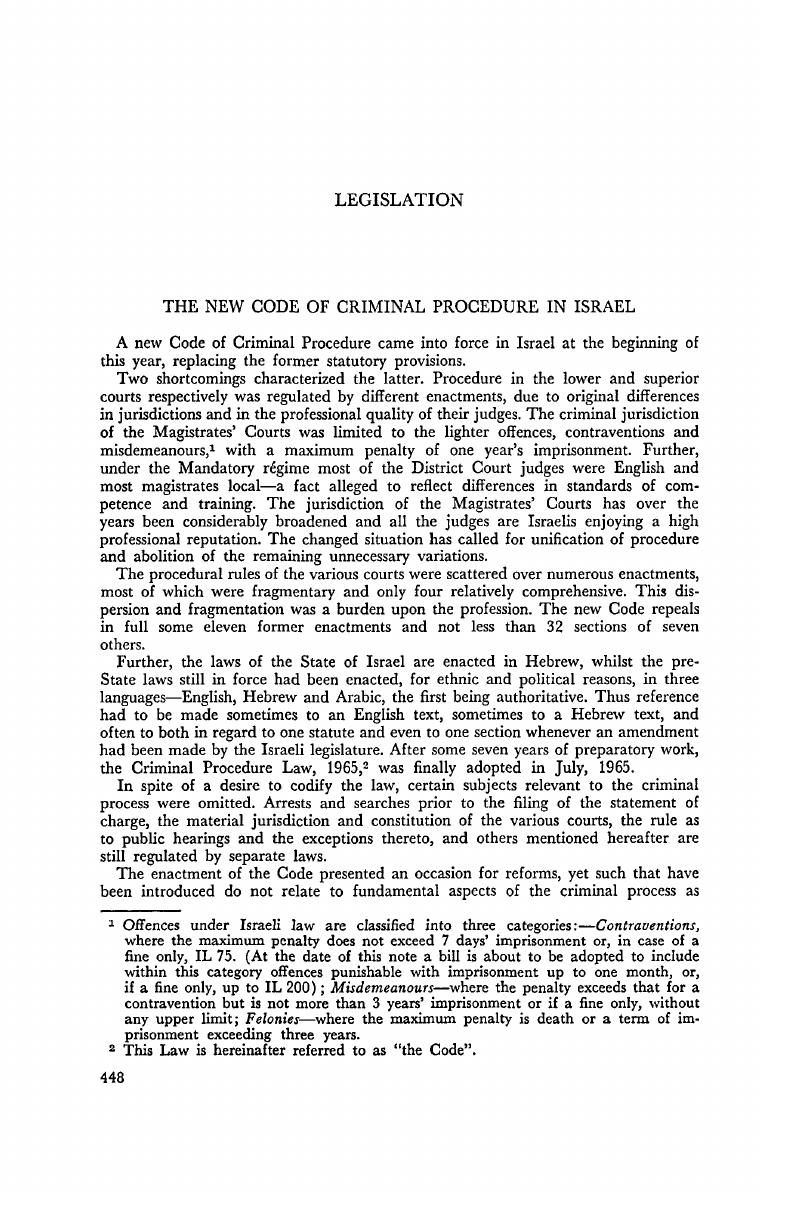Published online by Cambridge University Press: 12 February 2016

1 Offences under Israeli law are classified into three categories:—Contraventions, where the maximum penalty does not exceed 7 days' imprisonment or, in case of a fine only, IL 75. (At the date of this note a bill is about to be adopted to include within this category offences punishable with imprisonment up to one month, or, if a fine only, up to IL 200); Misdemeanours—where the penalty exceeds that for a contravention but is not more than 3 years' imprisonment or if a fine only, without any upper limit; Felonies—where the maximum penalty is death or a term of imprisonment exceeding three years.
2 This Law is hereinafter referred to as “the Code”.
3 The constitution and material jurisdiction of these courts are regulated by other acts—Municipal Courts Ordinance (Laws of Palestine, Vol. II, 1015) and the Courts Law, 1957 (11 L.S.I. 157).
4 Secs. 6–7, Criminal Code Ordinance, 1936; Areas of Jurisdiction and Powers Ordinance, 1948 (1 L.S.I. 25).
5 Among them may be mentioned offences under the Anti-Genocide Law, 1950 (4 L.S.I. 101), Anti-Nazi Law, 1950 (4 L.S.I. 154), Penal Law Revision (State Security) Law, 1957 (11 L.S.I. 186), and Penal Law Revision (Offences Committed Abroad) Law, 1955 (10 L.S.I. 7).
6 See e.g. Attorney General v. Salomon (1960) 14 P.D. 1093.
7 The only exceptions are offences under the Anti-Nazi and Anti-Genocide Laws, see n. 5 supra.
8 Prosecutors in the Municipal Courts may also be appointed by the municipal council. These prosecutors are not necessarily qualified advocates.
8a See Criminal Procedure Regulations, 1966 K.T. no. 1819, p. 618.
9 Laws of Palestine, Vol. II, 459. The Ordinance is expressly saved by the Code.
10 See Bitan v. Attorney General (1953) 7 P.D. 463; Suseik v. Attorney General (1955) 9 P.D. 1036.
11 Charge sheets filed in the disciplinary courts of the civil service in Israel have for several years been drafted in the same manner. No complaints have been brought to notice of difficulties or hardship caused thereby.
12 Shushi v. Attorney General (1960) 14 P.D. 1265.
13 Cf. R. v. Grodnowsky [1946] 1 All E.R. 561.
13a A defendant may also be ordered to be removed from the courtroom owing to misbehaviour in court, in which event if he is not represented by counsel,he must be notified of the proceedings held in his absence.
14 In which case the sentence is not executed unless the defendant commits, within a fixed period, another offence specified in the sentence.
15 This, however, does not make the trial an unrestricted inquiry into unlimited offences. The facts alleged in the statement of charge determine the relevancy of the evidence taken. If the prosecution wishes to widen the scope of the trial it should do so by amending the statement of charge which, after the commencement of the trial, may be made only by leave of the court.
16 Cf. Levi, Y., “The Treatment of Mentally Sick Offenders: A Comparative Analysis of Israel Law” (1966) 1 Is.L.R. 320–51 and 421–47.Google Scholar
17 (1954) 8 L.S.1. 206 as amended in (1960) 15 L.S.1. 122.
18 Cohn v. Attorney General (1949) 2 Psakim 216, 224.
19 El Odeh v. Attorney General (1942) S.C.J. 235.